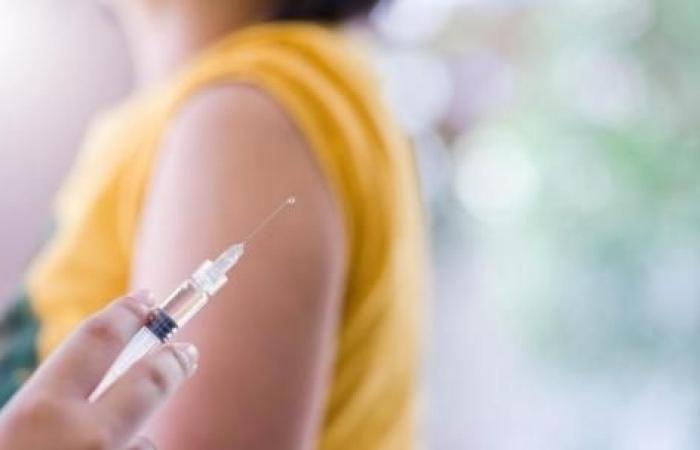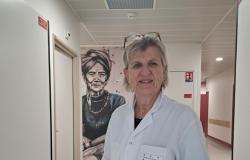THE ESSENTIAL
- At the end of 2023, HPV vaccination coverage is 54% among young girls for one dose and 25% for boys.
- The SFCPCV doctors point out that the effectiveness of this vaccine against cancers induced by the HPV virus is established, demonstrated and non-disputable.
- The earlier vaccination is done, the lower the risk of cervical cancer or pre-cancerous lesions.
Cancer of the cervix, but also ENT, anus, penis or even vulva and vagina… All these pathologies are induced by human papillomaviruses. For both women and men, vaccination – preferably before the age of 14 – is one of the most effective ways to prevent these diseases.
If this message has been widely heard in many European countries such as the United Kingdom, Spain or Italy, it still remains quite diffuse in France given its vaccination coverage. The French Society of Colposcopy and Cervico-Vaginal Pathology (SFCPCV) took advantage of its 48e national congress organized from January 9 to 11, 2025 in Montrouge to recall the importance of the anti-HPV vaccine and its effectiveness.
Cervical cancer: the earlier you vaccinate, the more effective the vaccine is
Almost all sexually active people will be infected with the human papillomavirus at some point in their lives. “From first sexual intercourse until the age of 30, 30% of women in an age group can carry a virus. So the virus is generally caught between the ages of 17 and 25. And during this period, every year, 20% of women are infected with a new HPV”confirms Dr Jean-Luc Mergui, member of the SFCPCV office during a press conference. Thus, on average at age 44, 80.9% of patients contracted HPV viruses. Similar observation among men. For their part, they are 89%. “On the other hand, when we look at the probability of acquiring the virus after 45 years, it is very low. It is of the order of 1%. The virus is really contracted at the beginning of sexual life”specifies the specialist.
Furthermore, if the risks of being in contact with HPV increase with the number of partners, just one may be enough. The probability for a woman who has only had one partner to be infected with human papillomavirus is 49% up to age 44. It increases to 74% with two partners and 88% between 3 and 6 partners. It is these observations that have led the High Authority of Health to recommend vaccination against human papillomavirus in adolescence. For the record, the recommendations provide for a two-dose vaccination schedule if the person is between 11 and 14 years old, and three doses if they are between 15 and 19 years old. And this goes for both girls and boys.
“The effectiveness of vaccination on cervical pathology is extremely important”recalls Professor Xavier Carcopino, President of the SFCPCV. “It is a vaccine based on a protein that resembles a viral protein which creates very effective immunogenicity. Its first major effectiveness is to prevent chronic infection with HPV, the risk factor for cancer of the cervix and HPV-induced cancers (ENT, penis, anus…Editor’s note).” A study carried out in the United Kingdom, where vaccination against papillomaviruses has been widely adopted, shows that the risk of cervical cancer is reduced by 87% for young girls vaccinated between 12 and 13 years old, and 62% between 14 and 16 years old and 34% for 16-18 year olds. Scientists estimated that this represented 448 cancers avoided.
“When we talk to the general public about cervical cancer, it is a somewhat forgotten disease, because it has become rare due to screening. On the other hand, pre-cancerous lesions of the cervix are extremely common. 30,000 women are treated each year and for all these women, it is an ordeal, because the treatment affects sexuality and fertility.underlines Professor Carcopino. However, the vaccine also reduces this risk.
-British work revealed that adolescents vaccinated between 12 and 13 years old were 97% less likely to have precancerous lesions on the cervix. The rate was 75% for those vaccinated between 14 and 16 years old and 39% among 16-18 year olds. “Thus, the earlier we vaccinate, the more effective the vaccine is. Furthermore, this effectiveness is established, demonstrated, non-disputable in the scientific literature with numerous trials, meta-analyses and studies which all validate the same result”adds the expert.
“We must desexualize the anti-HPV vaccine”
Despite these reassuring data, France remains behind on the issue of anti-HPV vaccination compared to its European neighbors. At the end of 2023, vaccination coverage is 54% among young girls for one dose and 44% for a complete schedule (2 or 3 doses). In boys – for whom vaccination has only been recommended since 2021 – the rates are 25% for one dose and 15% for a complete schedule. These figures are well below government objectives which target 65% of girls vaccinated with a dose of HPV1 and 47.7% for boys. And even more, the objective of 80% of people vaccinated by 2030. This represents a cumulative delay of 2 million unvaccinated people aged 20-26.
The vaccination campaign in colleges for 5th grade studentse, launched at the start of the 2023 school year, should erase this delay. But the support of parents and adolescents is very limited and can be explained in part by a lack of communication and pedagogy within the establishments. “However, we must be optimistic. Since the implementation of vaccination in schools, there has really been a clear progression between 2022 and 2023”notes Doctor Julia Maruani, Vice-President, SFCPCV. “This campaign has the merit of getting people talking about vaccination again. I have many patients who in consultation have asked me questions about the vaccine for their child”adds the doctor.
This opening of dialogue serves as a reminder that vaccination is not limited to the walls of the college. It can be done by a doctor, a nurse or a midwife, and also in a pharmacy. In fact, pharmacists and nurses are also authorized to prescribe and administer the HPV vaccine from the age of 11. “This was implemented in parallel with the campaign in colleges and it is real progress. It simplifies the process for parents”adds Dr Julia Maruani.
Beyond education and facilitating access to the vaccine, another point seems essential to SFCPCV doctors to promote an increase in vaccination coverage and prevent pathologies induced by human papillomaviruses: “We must desexualize the anti-HPV vaccine. It is not a vaccine against a sexually transmitted virus, but against cancer”concludes Professor Geoffroy Canlorbe, Secretary General, SFCPCV.






